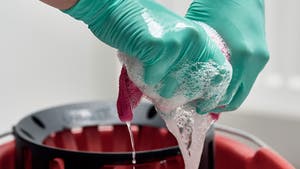In the ever-changing world of healthcare and infection prevention, there’s always a hot topic or new approach to an old problem. 2020 is sure to keep us on our toes with increasing emerging infectious disease threats like COVID-19 caused by the virus SARS-CoV-2, growing antimicrobial resistance, and the expansion of medical care and procedures to outpatient settings.

As an infection preventionist (IP), below are some themes I anticipate will be critical for infection prevention and environmental hygiene in 2020:
Tackling emerging antimicrobial-resistant organisms
As antimicrobial-resistant organisms such as Candida auris (C. auris) emerge, hospitals and healthcare facilities must develop strategies for rapid detection, isolation, and prevention, including effective environmental disinfection. This year will be one in which the industry must work to understand new and emerging resistant organisms. While these pathogens challenge antimicrobial response efforts, they will also require IPC to adapt through foundational disinfection practices. As antimicrobial-resistant organisms become more prolific and common in U.S. hospitals, guidance will come from the U.S. Centers for Disease Control and Prevention (CDC) and researchers. For example, with C. auris, the CDC has published a list of Environmental Protection Agency (EPA)–registered hospital-grade disinfectants effective against C. auris, including Clorox Healthcare® Hydrogen Peroxide Cleaner Disinfectants, and if none of these products is available, the EPA recommends using an EPA-registered hospital-grade disinfectant effective against Clostridioides difficile spores. In conclusion, it is vital that healthcare facilities engage in enhanced cleaning or stay aware of additional measures that the CDC is suggesting to stop the spread of pathogens that contribute to antimicrobial resistance.
Implementing infection prevention programs in outpatient settings
Today’s healthcare practice is increasingly pushing procedures to outpatient centers. However, it is critical that these types of facilities also have strong infection control programs akin to those found in acute-care facilities. Regulatory oversight is beginning to look at this issue and requirements are changing, which means facilities need to establish plans to incorporate infection prevention processes, such as staff training, into these previously overlooked outpatient settings. Routine rounding, risk assessments, and even staff surveys can help identify those opportunities to improve patient and healthcare safety in these unique healthcare environments. Outpatient settings need to take infection control just as seriously as their acute-care counterparts.
Investing in preparedness
From the recent COVID-19 outbreak in China to the Ebola outbreak in the Democratic Republic of Congo in 2019, emerging infectious diseases are increasingly becoming a part of the infection prevention playbook. In the U.S., the funding for the tiered hospital approach to special pathogens is set to expire, which means hospitals will have to start investing in preparedness. The tiered hospital approach was set into place following the 2014 Dallas Ebola cluster to ensure there were designated hospitals with enhanced measures to treat patients with special pathogens, like Ebola or SARS-CoV. This includes all preparedness measures, from personal protective equipment to environmental disinfection in areas where a patient with an infectious disease might be. Infection prevention programs play a critical role in preparing for future outbreaks, like COVID-19, and that means considering screening practices in triage and the importance of the i3 strategy (identify, isolate, and inform). Given the current outbreaks across the world, these topics have to be re-addressed in 2020.
Actively fighting flu instead of bracing for impact
Too often, hospitals and health facilities have approached flu season as a “brace for impact” situation, responding to cases and increases in severity as it intensifies. The 2019-2020 flu season is still going strong making it imperative for IPs to continue to actively fight flu through preventative measures instead of being reactionary. Healthcare facilities must focus on working with staff, so they are working proactively on the frontlines to prevent its spread and rapidly identifying and isolating patients with suspected cases. Moreover, for pediatric settings, it is vital to continue to emphasize the importance of hand hygiene and enhanced disinfection as children more often spread respiratory infections through contact.
From the community perspective, in addition to vaccination, we must continue to urge people to stay home when sick, implement correct hand hygiene and regularly clean and disinfect their work areas. Even in the midst of flu season, proactive habits are vital and are as easy as making sure your loved ones are vaccinated (flu shots are still available) or encouraging staff to stay home when sick.
Improving environmental disinfection practices and reducing human error
Environmental services, the primary department responsible for the safety and cleanliness of a hospital or other healthcare facility, are a critical component of infection prevention and healthcare; however, like many things environmental services can be prone to human error. With rising antimicrobial resistance and attention to healthcare transmission dynamics (i.e., studies showing how patients colonized with MRSA, VRE, or C. diff can easily contaminate their rooms), IPs are trying to improve environmental cleaning and disinfection, as well as addressing the human factor components. Technologies, like ready-to-use and no-touch solutions, have the capacity to improve disinfection compliance without relying solely on the capabilities of personnel.
2020 will be a critical year for infection prevention efforts as hospitals prepare for and respond to the COVID-19 outbreak. These efforts go beyond the normal work that focuses on reducing healthcare-associated infections in a growing healthcare environment. A severe flu season and growing concerns for antimicrobial resistance all shape infection prevention efforts and require a holistic approach to reducing the spread of infectious diseases in healthcare.
Dr. Saskia v. Popescu is a paid consultant for Clorox Healthcare.


